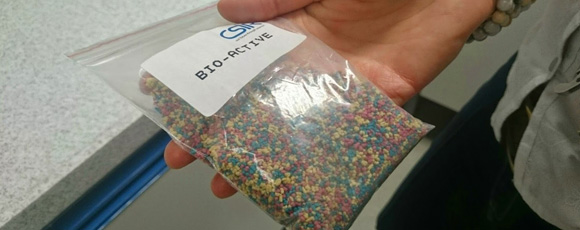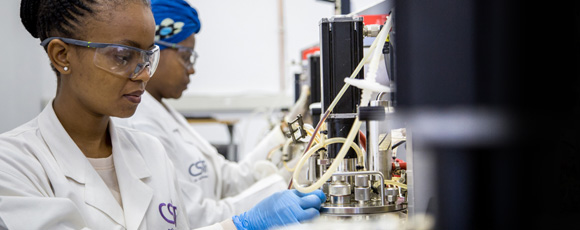|
The mixer looks like a giant version of the Kenwood-type cake mixer you might see on that popular reality TV show Cake Boss,
and the product not unlike the colourful hundreds-and-thousands often found atop cupcake icing.
But this is a different kind of treat, or rather treatment, and manufacturing it ain’t as easy as baking a cake.

BioActive was developed within the CSIR and is now produced on a small scale at the BIDC facility.
These bio-remediation pellets contain microorganisms and all the nutrients needed to “revive” them when they are added to contaminated
water. Image by ScienceLink.
These multi-coloured pellets contain microorganisms and all the nutrients needed to “revive” them. Just add water … preferably
contaminated water that needs cleaning through a process known as bio-remediation.
The pellets are produced on a small scale at the Biomanufacturing Industry Development Centre (BIDC)
facility at the Council for Scientific and Industrial Research (CSIR). Once packaged and labelled with the name
“
BioActive
”, it is sent to water treatment companies for testing. With their feedback, the bio-manufacturing process can be optimised in order to bring the product
to market, thereby attracting further investment to support up-scaled production.
BioActive was developed within the CSIR, making use of both its research and manufacturing infrastructures. But unfortunately for many other small biotechnology
companies in South Africa, while they may have great product ideas, they do not have access to the right resources to take it further.
“It’s a bit of a chicken-and-egg situation,” says Dr Dusty Gardiner, manager of the BIDC programme. “SMMEs (Small, Medium and Micro
Enterprises) need capital to manufacture prototype products they can pitch to investors, but without investment, they can’t set up their own manufacturing
infrastructure.”
The BIDC was launched to bridge exactly this gap. In a three-year partnership with the Jobs Fund and the
Department of Science and Technology, it supports product development – from idea productisation to small-scale
manufacture – for technologies owned by least 12 small companies.
ReSyn Biosciences, Linda Aromas, the Phephisa Natural Resources Institute and JVS BioTech are the first beneficiaries of the initiative, and Gardiner reports that
over 70 further enquiries have already been received.
“There is a set list of criteria we look at, but a major factor is whether the company can and will create jobs,” he says. The potential for employment
ranges from unskilled agricultural labour to research and development, through to manufacture and product distribution.
Project manager Lara Kotzé-Jacobs says the BIDC internship programme is producing a pool of skilled scientists and technicians to fill some of these jobs.
“Our interns learn how the equipment’s components work together, why it is built in a certain way and how to operate it. They work in teams and use
the machinery to generate products,” she explains. “It’s very hands on, not just theoretical.”
The BIDC can accommodate about 20 interns per year, and the first batch will complete the programme in March 2015. “The interns can add one year of actual
work experience to their CVs by going through our programme, and they obtain skills they could not have acquired through university alone.”

The BDIC trains interns like Lethabo Mashigo (left) and Nokulunga Maima (right) on bio-manufacturing equipment in order to provide the industry with a pool of skilled workers. Image provided by the BDIC.
Kotzé-Jacobs explains that to be eligible for an internship, candidates must have a basic degree (BSc or BTech) or diploma with fundamental knowledge of
biotechnology, engineering, chemistry or microbiology. More than 300 applications were processed for the current intake.
With this focus on technology and skills transfer, the BIDC also encourages the companies themselves to be part of the manufacturing teams, especially their
own technical staff.
“We’ve spent the first year getting the programme up and running, recruiting people, acquiring equipment and turning this warehouse into a
workspace,” says Gardiner, adding that their business model includes working with larger companies (R100 million turnover and above) to co-develop
products and technologies.
But for SMMEs, one of the greatest potential benefits the BIDC offers is that new technologies are “de-risked” for potential investors,
as Gardiner puts it. And, says Kotzé-Jacobs, it assists companies in making sure their products meet both regulatory requirements and quality standards.
In terms of future directions for the BIDC, opportunities do exist for partnerships with other technology incubators or enterprise creation initiatives.
“We’ve had a lot of success so far with established business entities, but our next challenge,” says Gardiner, “is how to help
individual scientists with great ideas.”
Dr Dusty Gardiner and chemical engineer
Lara Kotzé-Jacobs lead the BIDC team at the
CSIR in Pretoria, Gauteng. The BIDC provides process and
product development, process optimisation, scale-up, regulatory support, commercial manufacturing services and incubation of SMMEs to
enable the development of a vibrant and sustainable bioeconomy in South Africa and throughout the African continent.
|
|